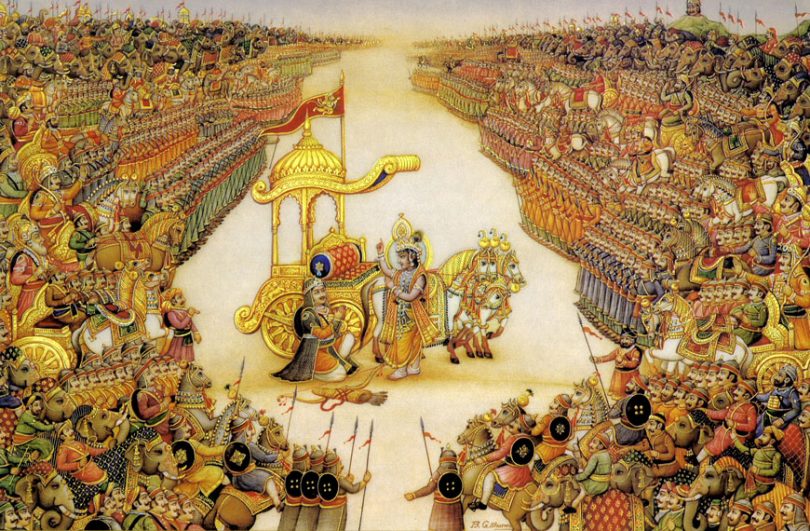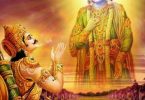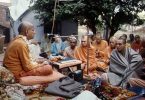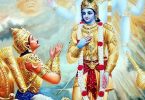Question: Brhat-bhagavtamrta is BBT’s latest publication. On p 414 there is an indication that Karna and Duryodhana were ‘partial incarnations of demons’. Could you supply the background to this statement? Was it due to the past life of Karna, or some other reason as to why he was destined to suffer so much and do so many bad things? What wrong deeds had he done in his previous life or in his present life as Karna?
Answer by Romapada Swami:
There are three different angles to consider this from. The first is simply from a scriptural or textual point of view.
1) In the Vana-parva of Mahabharata it is decribed that Duryodhana and Karna found out that the Pandavas were living in a forest nearby and decided to humiliate them. So, under some pretext, they took their army, dressed very opulently and headed that way. On the way, Duryodhana wanted to bathe in a river which is occupied by the Gandharvas. Owing to this, finally a battle ensued in which Karna was severely hurt and fled from the battle, while Duryodhana was held captive by the king of Gandharvas. One of his soldiers went to the Pandavas for help and under instructions by Yudhisthira, Arjuna battled the Gandharvas and rescued Duryodhana.
This humiliated Duryodhana to such a great extent that he resolved to give up his life by entering into type of self-igniting samadhi, much like we find at the end of Dhrtarashtra’s life. While he was doing so, the Danavas found out and performed a sacrifice to create a celestial goddess. She was instructed by the Danavas to go and get the subtle body of Duryodhana, which she did, and then brought Duryodhana before the Danavas.
The Danavas then explained to Duryodhana that he had been created as a result of a great sacrifice they performed to please Lord Shiva. His body was like a thunderbolt and his strength immense. They also mentioned that the powerful demon Narkasura has incarnated as Karna and “remembering his old enmity with Vishnu, will fight with great determination.” They also assured that at the time of the battle, great warriors like Drona and Bhishma would come under the influence of the Danvas and give up their natural compassion and discrimination to fight with great vigor against the Pandavas. Thus they assured him that Duryodhana’s victory was certain and that he should thus give up his resolve to commit suicide.
Elsewhere in the Mahabharata, the indication is given that Duryodhana was the incarnation of Kali.
2) Character evaluation of Karna
Our ISKCON translator of Mahabharata, Hridyananda Maharaja, makes the following comments in relation to Karna’s character. Karna was basically an evil person. Even though he was abandoned at birth, he was brought up in a very loving and nurturing family, so the generally accepted fact of a “dysfunctional childhood” really does not hold true.
He deliberately lied to get training from Parsurama and was simply envious of Arjuna (like trying to humiliate Arjuna in his graduation ceremony). In addition, there was his conduct with Draupadi, his refusal to accept the instructions of Krishna, and his steadfast friendship with Duryodhana, who was obviously evil. On more than one occasion Karna ran away from the battlefield leaving his friends and army exposed. In the Mahabharata war, he refused to fight alongside Bhisma because he did not want to share the glory. His charity etc. was the result of vows he had taken to enhance his own material position.
Though he had excellent parentage, namely Kunti and Surya, because he was conceived out of lust, fear, and anger, his character was thus shaped. Apparently, after summoning the Sun god, Kunti became fearful of the consequences, but also very much attracted to the Sun god (who was angry at being summoned trivially). During the time of pregnancy, he was concealed, thus there were no purificatory rites performed, and there was also the constant refrain of fear and connivance. All this combined to possibly shape Karna into what he finally became.
3) The third response to this question has to do with the principle of association. Through the association of Duryodhana, Karna’s character became debased. Even the direct son of Lord Krishna, Bhauma, born of Mother Bhumi through her contact with Lord Varaha, became changed from a good son to an asura due to his association with a bad person, namely Banasura







